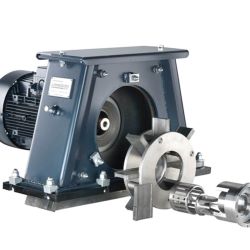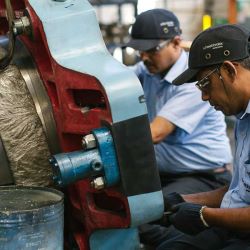Wheelabrator in Metelen, Germany, has delivered a satellite turntable (SDT) blast machine for Opel Austria’s engine and gearbox manufacturing facility. The new machine will precision shot peen rotationally symmetrical transmission parts.
What’s special about the new installation is that it includes a fully automated feeding system. It delivers sets of gears stacked on vertical pins directly to the machine, while also checking the correct stacking order against the selected blast programme – visually, through a camera system. This prevents loading as well as process errors.
Fast cycle times, high process control
The machine, type SDT 200/18-17.4-3/22, is designed for an annual operating time of 15 shifts per week across 46 weeks. Within this time, it has to meet an output target of 50,000 parts. To achieve this, the cycle time has to be 25 seconds or under.
The compressive stresses created in the workpiece surface during the peening process contribute critically to the behaviour of the gear in the gearbox. They therefore have to be applied consistently and with a high degree of precision. The satellite turntable machine concept fulfils these demanding requirements – particularly by working in conjunction with intelligent workpiece tracking and process monitoring.
Hand in hand with a robot double act
Lynchpin of the solution for carmaker Opel are two robot arms connected into the process by an advanced feeding system. One of the robots picks individual “skewers” or pins (pre-loaded with gears) from a pallet supplied via a roller conveyor, presents each pin to a camera for a visual check and then – provided the computer says yes – loads it into the machine. Inside the machine, the gear stacks are then clocked through the peening process. If the stacking order is wrong, the pin is ejected via a sluice for manual restacking. If this happens repeatedly, the whole pallet is ejected for restacking.
Shot peening is carried out by three roto-jet blast wheels that are supplied with abrasive through electromagnetic dosing valves. Thanks to a clever blast wheel arrangement, the combined blast streams of all three wheels covers three “satellites” (rotating workpiece holders) at the same time. The machine control enables the separate setting of values for blasting time, pause time and cycle time.
Process reliability and Industry 4.0
Heinrich Dropmann, Sales Director OEM Wheel at Wheelabrator, comments: “Especially for shot peening applications, process reliability is incredibly important. Compressive stresses have to be introduced very precisely to achieve the desired part characteristics. For us as blast equipment manufacturers the added challenge then is to achieve this process reliability in a high-efficiency environment like automotive. The solution for Opel combines latest advances in all these areas, but on the basis of a tried and tested machine concept.
Last year, Wheelabrator started offering a bundle of monitoring, control and sensor technologies as a patented process control package for SDT machines, which is available as an optional extra on “Standard“ machines. Special machines for demanding production environments, like the one developed for Opel, will continue to push the boundaries of process control R&D.


